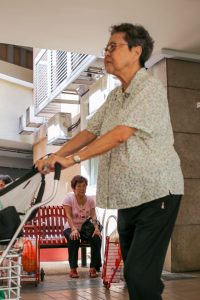Social support and health among older adults – the Singapore Chinese Health Study
September 30, 2021

The Agency for Integrated Care (AIC) aims to provide and connect caregivers and seniors with the information and services they need to stay active and age well. On the 1st of October 2020, the AIC launched the eServices for Financing Schemes (eFass), bringing greater convenience by eliminating the need to submit hard copies of application forms.
Although social support can contribute to better health among older adults, those in poor health may be limited in their ability to receive social support. In ‘Social support and health among older adults – the Singapore Chinese Health Study’ (Ageing & Society, 2021), Dr Jon Barrenetxea (Duke-NUS Medical School), Dr Yang Yi (Duke-NUS Medical School), Professor Kyriakos S. Markides (University of Texas Medical Branch), Dr Pan An (Tongji Medical College), Professor Koh Woon-Puay (NUS Saw Swee Hock School of Public Health), and Associate Professor Feng Qiushi (NUS Department of Sociology) study the health factors associated with social support among older adults in Singapore. Using the Duke Social Support Scale (DUSOCS) as a form of measurement, the team segregated the older adults that were interviewed into four groups – ‘overall supported’, ‘family oriented’, ‘loners’, and ‘family restricted’ – based on the source and amount of social support they received. Those with poor self-rated health, instrumental limitations, cognitive impairment, and depression had lower social support scores and a higher likelihood of being ‘family restricted’.
Just as the health selection theory suggests, those with poor health have fewer resources to maintain social relationships. Through the study, the team discovered that the relationship between social support and health is bidirectional and dependent on the health status of the individual. It was found that while older adults in poor health have lower social support scores, they were more likely to receive a lot of support from children. Therefore, lower social support scores among Singaporean older adults in poor health may not necessarily indicate a lack of social support, but suggests that social support tends to be restricted to that provided by children. This is especially since in Singapore, the government places family as the first line of support for older adults, followed by support from the wider community. This is likely to be similar in other Asian societies where filial piety is heralded as an important cultural norm, and unlike Western societies where the state plays a larger role in eldercare. Additionally, men relied more on family sources of support than women, while women had more non-family support. Those with higher education levels also received more non-family support.
Worldwide, the proportion of older adults is increasing while family size is decreasing. Community interventions will thus have to fill this gap in social support. 50% percent of the cohort interviewed for the study were found to rely primarily on their children, with only a very small proportion of individuals having little support from spouse or children. Therefore, the team suggested that interventions addressing social support gaps in Singapore should be targeted at older adults in poor health that live with their immediate family, rather than the current audience of older adults living alone.
Read the article here.
